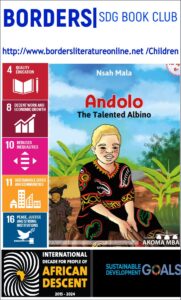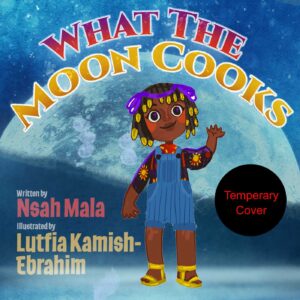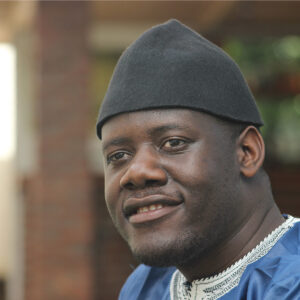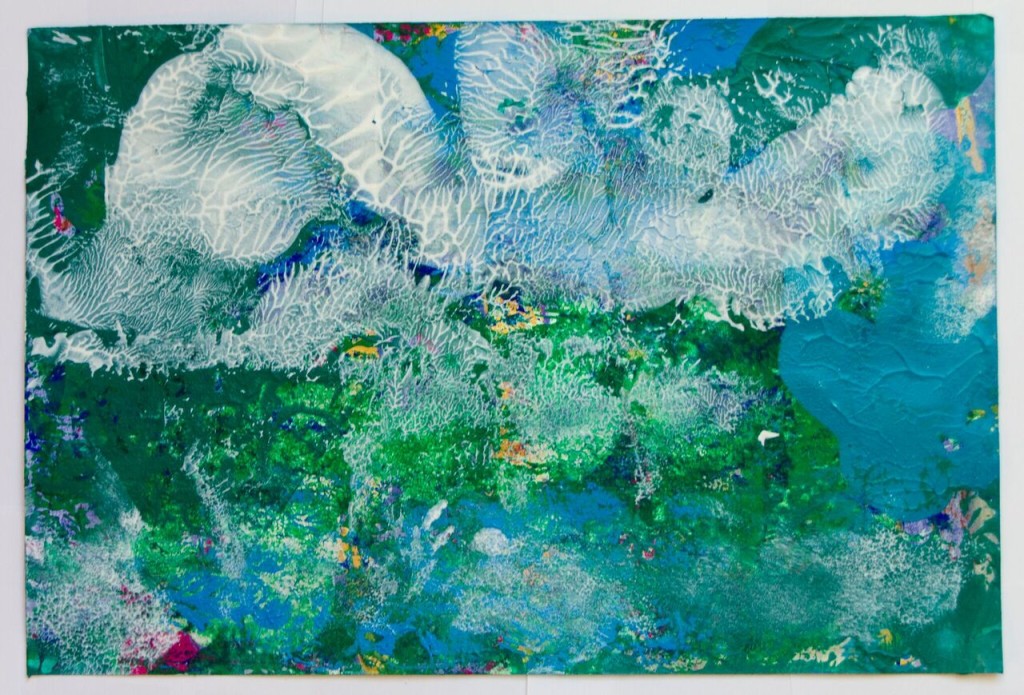In September and October 2020, I had the good fortune of listening to a series of Borders SDG Book Club Zoom sessions conducted by Olatoun Gabi-Williams interviewing guests focusing on the children’s book “Andolo, the Talented Albino” (published in English and French) which featured Nsah Mala as the author, and Akira Junior as the illustrator, as well as two young readers called Christabel Tuh and Ryan Nsom.
Throughout those discussions it was clear that both you Nsah, as the author, and Akira, as illustrator, address many social issues making sure that the lens is a genuinely tied to African experiences and not dictated by international debates and agendas mostly generated outside of Africa.
So, in this two part interview, Part I with author Nsah Mala and the upcoming Part II to be published on 1 May, 2021 in issue n. 8 with illustrator Akira Junior, I ask the following questions.

Pina Piccolo: In creating the character of the multi-talented albino Andolo, a boy who is not only integrated in the society but is even the object of admiration for the bullies, you have drawn on the experience of some of your family members in Cameroon. Was that personal connection very important in your ability to create a character that rang true to life and was not simply an idealized, didactic tool? I ask this question because children are normally very sensitive to adults pulling the wool over their eyes… they are sophisticated in that respect in ways that we adults sometimes don’t acknowledge, so in a way they constitute a challenge at the level of the register and content of communication.
Nsah Mala: Absolutely, that personal connection was key in my ability to create the believable character of Andolo. I know what you mean: children readers do not like to be underestimated or talked down to. And one always has to be conscious of this in their selection of diction and content for children’s books.
Pina Piccolo: Given the vastness of the continent, the enormous diversity of experiences and traditions occurring in the different regions – in this case some being extremely hostile to albinos – did you factor in these differences when creating the character? I know the book was published in English and French, did you envision the book as having readership all over the continent and outside of it? If so, did you keep in mind places that are extremely hostile to people with that condition?
Nsah Mala: I wrote the book from a Cameroonian perspective, more specifically from a Mbesa perspective because the Mbesa people have a very positive culture towards albinos, but I envisioned the book as having a continental and international readership for the reasons you just evoked. In Africa, as elsewhere, hostility towards and discrimination against albinos varies from kingdom to kingdom, ethnic community to ethnic community, country to country, and so forth. As I will tell you in a while, I had some parts of Africa which are extremely hostile to people with albinism in mind before, during and after writing the book.
Pina Piccolo: In crafting the story, how did you deal with, on one hand, building up the self-confidence of potential readers affected by the condition and, on the other, combating the lack of knowledge about albinism which leads to the stigmatization of albinos? Do you think the book would have been different if you wrote in Tanzania, for example?
Nsah Mala: My main goal in the book was to celebrate people with albinism, or (coincidentally to borrow from the 2020 World Albinism Day theme) to show that albinos are born to shine, thereby helping to raise the self-confidence of potential readers affected by albinism and to help other readers become more understanding, tolerant, inclusive, and loving towards all people with albinism.
Combatting the lack of knowledge about albinism is therefore addressed more implicitly in the book. And I will consider doing so more explicitly in subsequent editions of the book (e.g. through the back matter) or other related books…
Meanwhile, as I promised a while ago, it was mainly against the backdrop of being aware of certain parts of Africa which are extremely hostile to albinos that I wrote the book. In fact, I originally wanted to submit the story to a publisher in Tanzania, but because that publisher promised but never replied me on an earlier manuscript about something else, I decided to have “Andolo” published in Cameroon. Even in doing so, I still informed my Cameroonian publisher that I was struggling to find an East African co-publisher for the book. Fortunately, a high-profile person with albinism in Kenya has shown interest in the book and we are exploring some possible collaborative opportunities there. And to answer your question more directly, I would not have changed anything significant if I had the book published in Tanzania since I wanted to share the Cameroonian and Mbesa experience with others. But without doubt I would have written the book differently if I had conceived it based on some of horrible stories we often hear about people with albinism in some parts of the continent, especially in the east.
Pina Piccolo: How were you able to incorporate these two concerns (for the albino child and for the uninformed others) and still make the book fun to read? Do you find differences in writing books for adults and books for children in this respect? What do you think of graphic novels which incorporate the visual and the writing but are aimed at older audiences?
Nsah Mala: As I’ve already said above, my main focus was on celebrating the albino child, and the aspect of educating the uninformed others then flew in more or less naturally. I guess that if I had wanted to pursue those two goals on the same footing, there would have been a risk of didacticism taking over the story. I don’t think that there is any big difference between writing books for adults and books for children in this respect: focusing on characters and plot, at least for me, leads to compelling stories and helps to avoid the risk of too much didacticism which comes with a focus on wanting to teach (not only tell) more than show. Besides, children’s books are often bought by adults who also read them, and some children also read adult books. So, in the end there seems to be no literature for a particular age group. And this opinion of mine extends to graphic novels and comics as well.
Pina Piccolo: You are a poet normally writing for adults. How was your experience of writing a book in verse for children different from your standard experience of writing poems? Did you have a visual component in mind even as you wrote the verses? Were you able to convey it and share it with the illustrator?
Nsah Mala: The major challenge for me was selecting appropriate vocabulary for children without talking down on them. Of course, visualization was a major component of the writing process, as it is for any book meant to be illustrated. Yes, I shared some of my visualizations with the illustrator, but Akira’s creativity still shone through as well as the impressive input from my publisher Éditions Akoma Mba. And I’m glad that our collaboration paid off with a good book.

Pina Piccolo: You have written other children books including “Le petit Gabriel commence à lire” published in France by Éditions Stellamaris, “Little Gabriel Starts to Read” published by Spears Books in the USA, and a forthcoming one titled “What the Moon Cooks” which has been acquired by POW! Kids Books in the USA. Given that “Andolo” addresses a particular experience of disability and has more direct educational goals, a more explicit ‘mission’ let’s say. Did you go through a different process in conceiving it? How did you manage to incorporate the playful elements that would make it attractive to a child? Have you had feedback from readers, teachers, families?

Nsah Mala: The process of conceiving the book was not so different from that of other books, except that much of its inspiration came from known persons with albinism in my families and community of Mbesa Kingdom. While the book has implicit educational goals, according to me, the playful elements and humor were absolutely necessary in order to make it more entertaining, than didactic, to both children and adults. And I am happy to learn from people like you that I succeeded with that. So far, I have received tremendously positive feedback from kids, parents, reviewers, book clubs, and so forth. For example, two Cameroonian newspapers – L’Anecdote and The Guardian Post – have published heart-warming reviews of “Andolo” in French and English respectively.
Pina Piccolo: Given that African demographics are greatly skewed towards young people (compared to let’s say Europe, North America, or Asian countries like Japan), how does that translate for writers in envisioning their potential readers, how does it affect writing styles, themes, languages used?
Nsah Mala: Your observation about African demographics is apt. And this implies that there is a huge market for books aimed at young people in Africa on the condition that our publishing industries become sufficiently vibrant and that more and more people, especially the youth, develop an appetite for reading which goes beyond reading only prescribed books on educational booklists. Definitely, when writing for young audiences, from board books through picture books and middle grade to young adult (YA) fiction and everything between, specific aspects of style as well certain themes can be particularly appropriate. Afterall, what shall a writer profit if their work is neither accessible nor appealing to their target audience? Of course, the dominant languages of writing on the African continent are still colonial languages such as English, French, Portuguese, and Spanish, but in order to tap from our growing demographic potential and also foreground Africa’s cultural and linguistic diversities, it is important to also write in African indigenous languages (as I sometimes do in my native Mbesa). Moreover, there is scholarly evidence that children who start learning and reading in their mother tongues often do better than those who start in foreign languages.
Pina Piccolo: Writing a children’s book gives you the opportunity to reach an audience that can be more influenced towards change, compared to an adult audience. What do you think are some of the specific responsibilities of writers in this respect?
Nsah Mala: On the contrary, I think that literature has a huge propensity to influence people towards change, both adult and kid literature. This is particularly the case when it comes to environmental literature (the object of my current doctoral research) for instance. However, I agree with you that children are more susceptible to be being influenced by books than adults. Consequently, writers for children have the utmost responsibility of striving to handle all themes in ways that must lead to more positive, tolerant and inclusive behavioral changes among kids.
Pina Piccolo: Generally speaking, what are some of the challenges and satisfactions of maintaining an outlook centered on African issues and still being able to reach audiences outside the continent or in the diaspora? Who are your models in achieving that balance? What are some of the debates going on among Africa-based African writers and visual artists on the issue of creating art works generated by genuine African experiences in a world that is increasingly globalized?
Nsah Mala: A very good question, Pina. Personally, I think it is both normal and natural for African writers and artists to ensure that we address our issues according to our own desires and tastes, and not in order to respect Euro-American agendas and expectations of us. It is our duty to represent ourselves and engage with our issues in ways that are relevant to us, thereby bringing our own quota to international debates and agendas as active participants. In terms of satisfaction, I feel fulfilled when contributing to African voices in global conversations. Regarding challenges, the most obvious is the Euro-American gatekeeping we all know about in the publishing industry. It is often very difficult to find western publishers for our work when it does not fit their (oft stereotypical) expectations of the African continent. In terms of models, I have many, including Chinua Achebe, Ngugi wa Thiong’o’, Wole Soyinka, Babila Mutia, Mongo Beti, Imbolo Mbue, to name but a few. While there are substantial discussions and events in Africa about literary fiction, it seems to me that very few of such opportunities exist in the areas of writer-visual-artist or writer-illustrator collaborations. My hope and prayer are that (more) platforms should emerge to fill this gap.

Nsah Mala is a poet and writer from Mbesa, Cameroon. He writes in Iteanghe-a-Mbesa, English, and French. He has published five poetry collections: Chaining Freedom, Bites of Insanity, If You Must Fall Bush, CONSTIMOCRAZY: Malafricanising Democracy, and Les Pleurs du mal (French). In 2016, he won the Ministry of Arts and Culture Short Story Prize in Cameroon and le Prix Littéraire Malraux in France in 2017. As a writer for children, his published picture books include: Andolo – the Talented Albino (English), Andolo – l’albinos talentueux (French), and Le petit Gabriel commence à lire (French). He translated the picture book Be a Coronavirus Fighter (Yeehoo Press) into French as Un Combattant du Coronavirus in March 2020. Nsah Mala’s picture book, What the Moon Cooks, will be published in spring 2021 by POW! Kids Books (USA).





















































Comments 1